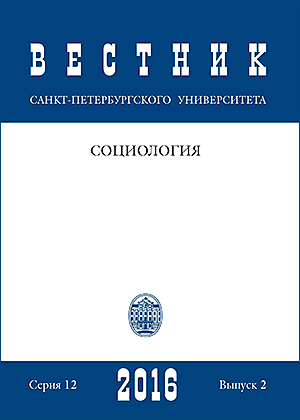КОНЦЕПТУАЛИЗАЦИЯ ПРОБЛЕМЫ СВОБОДЫ СЛОВА В НЕОИНСТИТУЦИОНАЛЬНОЙ ТЕОРИИ
DOI:
https://doi.org/10.21638/11701/spbu12.2016.205Аннотация
В статье представлен неоинституциональный анализ проблемы реализации свободы слова в условиях распространения сетевых коммуникационных технологий. Автор предполагает, что существующее понимание свободы слова, меры ее обеспечения и регулирования основаны на модели централизованного распространения информации и не учитывают особенностей сетевой модели осуществления коммуникации в интернете. По сравнению с массмедиа интернет оказывается встроенным в иные институциональные рамки и практики, которые делают применение существующих подходов к регулированию недостаточным. Исследование социального контекста реализации свободы слова в неоинституциональной перспективе способно обновить теоретическое понимание проблемы и определить альтернативные существующим направления ее решения. Неоинституционализм делает акцент на регулировании поведения как многоуровневном и многостороннем процессе. В него входят не только формальные правила, устанавливаемые в условиях неравенства полномочий, но и нерефлексируемые нормы и закрепленные в культуре смысловые рамки, предоставляющие альтернативные основания регулирования поведения. Так, институционализация той или иной модели реализации свободы слова зависит не только от централизованно принимаемых правил и целей, но и от нормативных и культурных контекстов, опосредующих этот процесс. Расширение доступа к интернету не является достаточным условием для осуществления свободы слова, если оно игнорирует действие неформальных норм и культурных особенностей, связанных с этим правом. Библиогр. 30 назв.
Ключевые слова:
свобода слова, цензура, интернет, неоинституционализм, институты, регулирование, публичная сфера
Скачивания
Библиографические ссылки
References
Загрузки
Опубликован
Как цитировать
Выпуск
Раздел
Лицензия
Статьи журнала «Вестник Санкт-Петербургского университета. Социология» находятся в открытом доступе и распространяются в соответствии с условиями Лицензионного Договора с Санкт-Петербургским государственным университетом, который бесплатно предоставляет авторам неограниченное распространение и самостоятельное архивирование.




